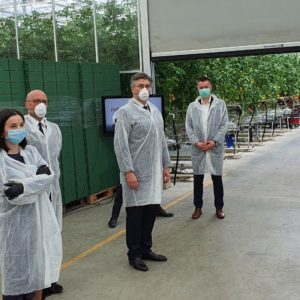Prime Minister of the Republic of Croatia and associates visit Belje
28. April 2020.As part of his working visit to Eastern Slavonia, Andrej Plenković, the Prime Minister of the Republic of Croatia, along with Marija Vučković, the Minister of Agriculture, visited the Mitrovac agricultural complex in Belje, which includes a dairy cow farm, a biogas plant and a greenhouse for tomato production.
The Mitrovac production system, which is based on the synergistic connection of the dairy cow farm with 2,000 head capacity, the 2 MWh biogas plant and the 4.5 ha greenhouse, was presented to the government delegation. The biogas plant uses part of the raw material from the farm to produce electricity and thermal energy, which is used in the greenhouse for year-round tomato production.
The Mitrovac agricultural complex thus illustrates the basic tenets of Belje’s operations – local food production, traceability “From Farm to Fork” and sustainability, which have all proven to be extremely important for the Croatian economy in these trying times.
As the largest agro-industrial complex in Croatia, Belje’s agricultural production follows all global trends and has the capacity to produce sufficient amounts of local food. Belje cultivates 20,000 hectares of arable land and 650 hectares of vineyards, produces 35 million litres of milk per year and accounts for 35% of Croatia’s pig production and 14% of Croatia’s young cattle production.
“With the agricultural potential that Belje has, along with the whole of Slavonia and Baranja, Croatia has the capacity to produce sufficient quantities of food, primarily for its own needs, but also for export. Belje systematically invests in the development and strengthening of its production capacities and continuously produces local food on our arable land and farms. Despite the challenging circumstances that we are facing, all agricultural work has been carried out as planned and all our production facilities work at maximum capacity, as evident from the results of the fodder factories, which recorded the largest monthly production in the company’s history in March,” said Davor Bošnjaković, director of Belje Plus.
Vlado Čondić Galiničić, Fortenova Group’s Executive Director for Agriculture and president of the agriculture group of the Croatian Chamber of Commerce, points out that the coronavirus crisis has shown the importance of local agricultural production and the food industry connected to it.
“This knowledge can be used to strengthen the national agriculture strategy and resource management. A serious structural determination in regard to what we want and can produce in the forthcoming period is now necessary, i.e. a decision must be made in regard to the products in which we strive for self-sufficiency, and we should then develop in that direction. As a country, we can produce sufficient meat, milk, cereals… since there is enough space, experience, historical knowledge and people willing to work,” Čondić Galiničić said.
Among other things, Fabris Peruško, chief executive officer of the Fortenova Group, drew the government delegation’s attention to the fact that Fortenova Group’s strategic tenet of developing regional agriculture and local food production in all markets where it is present, and of emphasizing local products in procurement and sales, was one of the key factors during the coronavirus crisis for securing the market supply of the most important food products.
“Fortenova Group’s specific advantage was its regional presence and cooperation, since the economic flows within our region were functioning despite the global crisis,” Peruško said, adding:
“Companies like Fortenova Group can lead the way in strengthening the offer of local products both on the domestic market and in export. This particularly applies to agriculture and food production, because we have all the prerequisites for it – heritage, high quality of products and consumers who are used to such products and greatly appreciate them. Intensive development of local production should thus count on even higher domestic consumption, which will then also strongly contribute to preserving Croatia’s economic activity and jobs in.”

